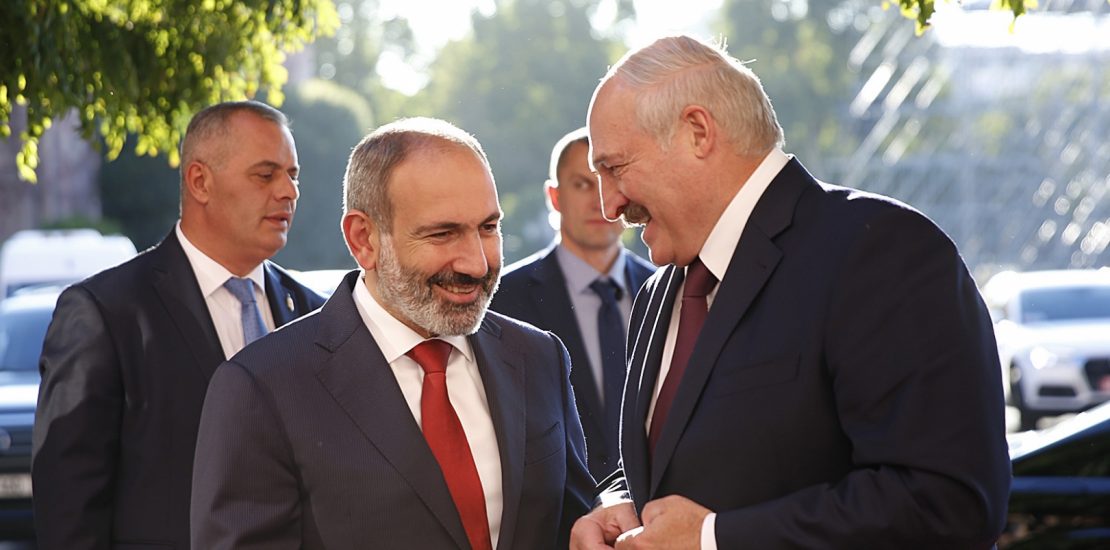- 8 February, 2022
- Eurasian Economic Union

In an interview with well-known Russian pro-government journalist Vladimir Solovyov on February 7, President of Belarus Alexander Lukashenko made some baffling statements about Armenia.
Speaking about the union state of Russia and Belarus, the head of the state, who is considered a nominal ally of Armenia, mentioned in the interview that most of the post-Soviet countries, including Armenia, will sooner or later join that union state.
“Well, Armenia has no place to go. Do you think anyone needs them? They have already witnessed it,” Lukashenko said, adding that Belarus is already in that security zone, Kazakhstan has learned a good lesson (meaning the waves of protests in Kazakhstan in January and temporary deployment of CSTO peacekeepers into the country – Ed.), Ukraine may join in the next 15 years, but Azerbaijan will not, because Turkey helps the Azerbaijanis a lot.
A day later, the spokesperson for the Armenian Foreign Ministry referred to Lukashenko’s “original geopolitical analysis”, noting that what he said was aimed primarily at serving his own country’s domestic political agendas.
Nevertheless, Lukashenko’s really original statement led to debate on Armenian-Belarusian relations.
Below we will provide brief information about these relations and some remarkable episodes.
Relations
According to the Foreign Policy Map prepared by the Union of Informed Citizens, which provides brief information on Armenia’s relations with all countries (the main source is the Armenian Foreign Ministry), diplomatic relations between Armenia and Belarus were established on June 12, 1993. Armenia, like most other post-Soviet countries, is a member of the Commonwealth of Independent States (CIS) established after the collapse of the Soviet Union.
In addition, Armenia and Belarus are security allies within the framework of the Collective Security Treaty Organization (CSTO), and are members of the same economic union (the Eurasian Economic Union). The relations between Armenia and Belarus are also based on 82 intergovernmental agreements.
Nevertheless, the Armenian-Belarusian trade turnover figures are not as high as the number of intergovernmental agreements. Thus, according to armstat.am, in 2021 the foreign trade turnover of Armenia and Belarus amounted to only about $ 86 million. For comparison, let us mention Ukraine, which is not in the same economic union with Armenia, but the trade turnover between the countries amounted to about $ 169 million in 2021.
Remarkable episodes
Despite the circumstances mentioned above, the remarkable episodes in the relations between Armenia and Belarus are mostly negative.
During the April 2016 war, the Foreign Ministry of Belarus issued a statement emphasizing the territorial integrity and inviolability of the borders of the conflicting parties, after which the Ambassador of Belarus to Yerevan was summoned to the Armenian Ministry of Foreign Affairs.
Another negative episode was related to blogger Alexander Lapshin, who visited Nagorno Karabakh and was arrested in Belarus and extradited to Azerbaijan, where he was prosecuted. One of the negative episodes was the supply of Belarusian “Polonez” multiple launch rocket systems to Azerbaijan, which, by the way, were used during the 44-day war against Armenia in 2020.
And another episode
However, there is one “bright” episode in the history of the relations between Armenia and Belarus.
Presidential elections were held in Belarus in August 2020, which, according to international organizations and most of the world’s civilized countries, were, to put it mildly, disgraceful and did not express the will of the people of Belarus. However, shortly after the announcement of the preliminary “results” of the election, at a time when police in the streets of Minsk and other cities of Belarus were using force against peaceful protesters, Armenian Prime Minister Nikol Pashinyan hurried to congratulate Lukashenko on his election victory. Pashinyan acted even faster than many leaders of countries with a level of freedom and democracy comparable to Belarus, such as Azerbaijan.
In conclusion, it should be stated that the relations between Armenia and Belarus at least do not correspond to the logic of the existing agreements, and common membership in a number of supranational organizations.
Vahe Ghukasyan
Union of Informed Citizens




